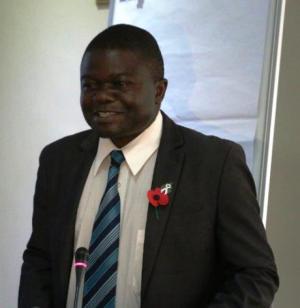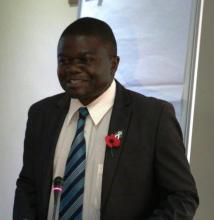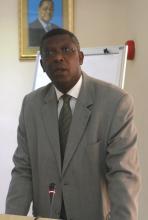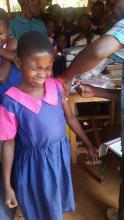Training of Trainers on cervical cancer prevention and control for the AFRO 10 countries – Sunbird Capital Hotel, Lilongwe
From 7 to 12 November 2016, the Ministry of Health and the World Health Organization in Malawi conducted the inter-country Training of Trainers meeting on Advocacy, Information and Communication and strategic planning for cervical cancer prevention and control. The meeting took place at the Sunbird Capital Hotel in Lilongwe and it was opened on the morning of 7 November by the Honorable Minister of Health, Dr Peter Kumpalume, MP. The participants were from Kenya, Nigeria, Zambia, Senegal, Zimbabwe, Madagascar, Guinea, Sierra Leone, Ghana and the host country Malawi. Dr Eugene Appiah Nyarko, the WHO Representative for Malawi was also present.
The Guest of Honor, Honorable Minister of Health, Dr Peter Kumpalume, speaking during the opening ceremony informed the participants that Cervical Cancer is a major health problem in Malawi, being the commonest cancer among women accounting for almost half of all cancers in the country. "It is estimated that over 2,300 women develop cervical cancer and over 1,600 die from the disease every year in Malawi. In our country there are over 4 million women that are aged 15-49 years old and these are at risk of cervical cancer. High HIV and Human Papilloma Virus (HPV) prevalence estimated at 12.9% and 33.6% respectively are the main risk factors for high burden of cervical cancer in Malawi" Honorable Dr Kumpalume said.
In his remarks Dr Eugene Nyarko, WR Malawi said, "To succeed in the fight against cervical cancer, WHO has developed specific tool kits in order to reverse the growing burden of cervical cancer in the Region. These tool kits are aimed at generating support among key government ministries, departments, agencies and partners for cervical cancer prevention and control. The use of tool kits will help informed and active participation in raising public awareness, vaccinating girls against human papilloma virus which causes cervical cancer, screening and treatment of sexually active women."
The key facts are that cervical cancer can be preventing by raising public awareness, vaccinating adolescent girls aged 9-13 years against human papilloma virus (HPV), the virus that causes cervical cancer and, screening women who are sexually active for cervical at least once every three years. Cervical cancer screening and treatment services are available in most government, CHAM or private health facilities. In 2013 Malawi introduced the HPV vaccination programme in two districts (Zomba and Rumphi) and plans to scale up are in the pipeline.
______________________________________
01 Honorable Minister of Health Dr Peter Kumpalume, MP speaking to participants at the opening ceremony of the TOT cervical cancer capacity building workshop
02 WHO Representative in Malawi speaking to the participants during the opening ceremony on the morning of 7 November 2016
03 A young receiving the Human Papilloma Virus (HPV) vaccine that prevents cervical cancer during the HPV immunization pilot campaign in Zomba
04 Participants from the 10 African Region countries that attended the capacity building for national cervical cancer prevention and control health workers




